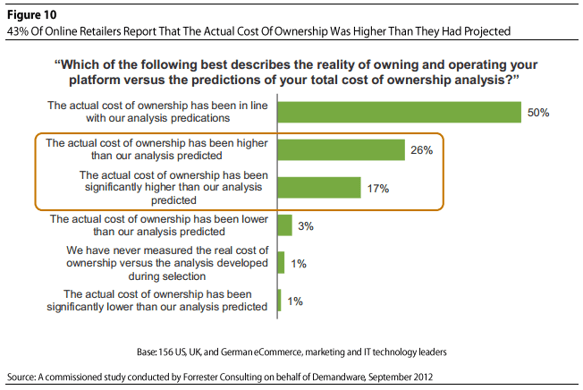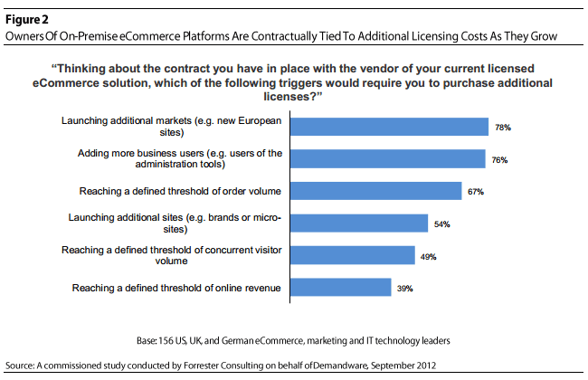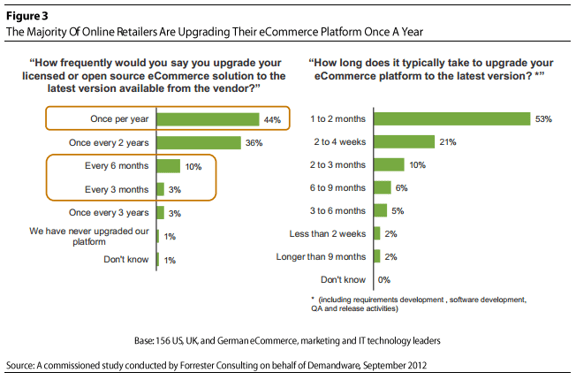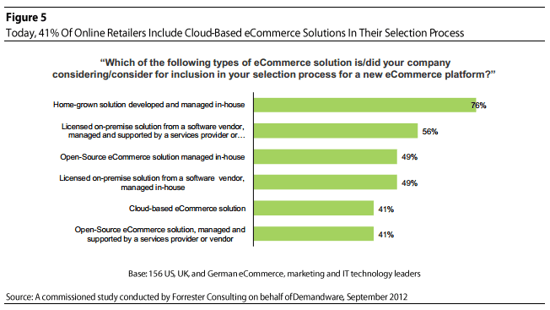The Hidden Costs of Ecommerce Platforms

An online store can only be as successful as the ecommerce platform that is running it, which is why it is vital for merchants to map out their business's needs, goals and budget before they make a commitment to a solution.
But despite this preparation, a new Demandware study reveals that 43 percent of all ecommerce platforms end up having a higher total cost of ownership (TCO) than predicted.
In fact, the "Understanding TCO When Evaluating Ecommerce Solutions" study, which was conducted by Forrester Consulting, found that online retailers spend an average of 7 percent of their total online revenue to support their ecommerce platforms, however, 74 percent of merchants don't believe that their current solutions will scale to support their planned growth.

Hidden Costs and Limitations
Merchants using homegrown or a licensed on-premise ecommerce platform may end up paying a higher TCO because they usually need to purchase additional licenses to grow their business.
For example, 67 percent of retailers using a licensed on-premise solution report that they are contractually obligated to acquire additional licenses when reaching a certain threshold of online traffic, while 78 percent of online retailers report that their vendor contract restricts them from using the technology into new markets.
This means that many ecommerce platforms are restricting online stores' growth initiatives, such as international and multichannel expansion.

Not only is the TCO for many ecommerce platforms higher than expected, but one of the study's most surprising metrics reveals that due to the complexities associated with upgrading an ecommerce platform, 39 percent of retailers only upgrade their platform to the latest version once every two to three years. This could be attributed to the long amount of time that it typically takes to complete an upgrade, but regardless, it means that these retailers risk falling behind their competitors by not staying up-to-date with basic functionality and usability features.

The Cloud is Gaining Trust
The complexities and lack of support of current ecommerce platforms has led 25 percent of retailers to plan on re-platformming within the next two years, and a further 29 percent will re-platform within four years. According to the report, these merchants will seek a platform that supports their business's multichannel and global expansion goals, as well as one that caters to digitally connected consumers. Although 81 percent of online retailers currently use a homegrown or licensed on-premise ecommerce solution, some retailers are looking to the cloud for better performance despite the uncertainties that still surround cloud-based solutions.
"In the first generation of ecommerce, when CIOs had to build everything from scratch, retailers took on major new costs to develop and operate platforms, which over time became assumed - and sometimes forgotten - in the P&L (profits and loss)," said Jamus Driscoll, senior VP of marketing for Demandware. "We believe the study clearly shows that as retailers move forward into a new digital world, they also need to pause and challenge yesterday's assumptions regarding the costs of ecommerce. It's time to think differently."
Cloud-based platforms can be beneficial because they tend to offer upgrades that are easy to implement and also don't restrain growth possibilities. While 44 percent of the survey respondents state that they still perceive cloud-based solutions as lacking maturity, 41 percent are also now including cloud solutions in their selection process.

Regardless of a merchant's preference for cloud or homegrown solutions, they should remember that selecting an ecommerce platform is a long-term decision. This means that they need to take hidden costs, features and functionality into consideration when researching solutions. And most importantly, merchants should choose a platform that has the ability to grow with their online business.








